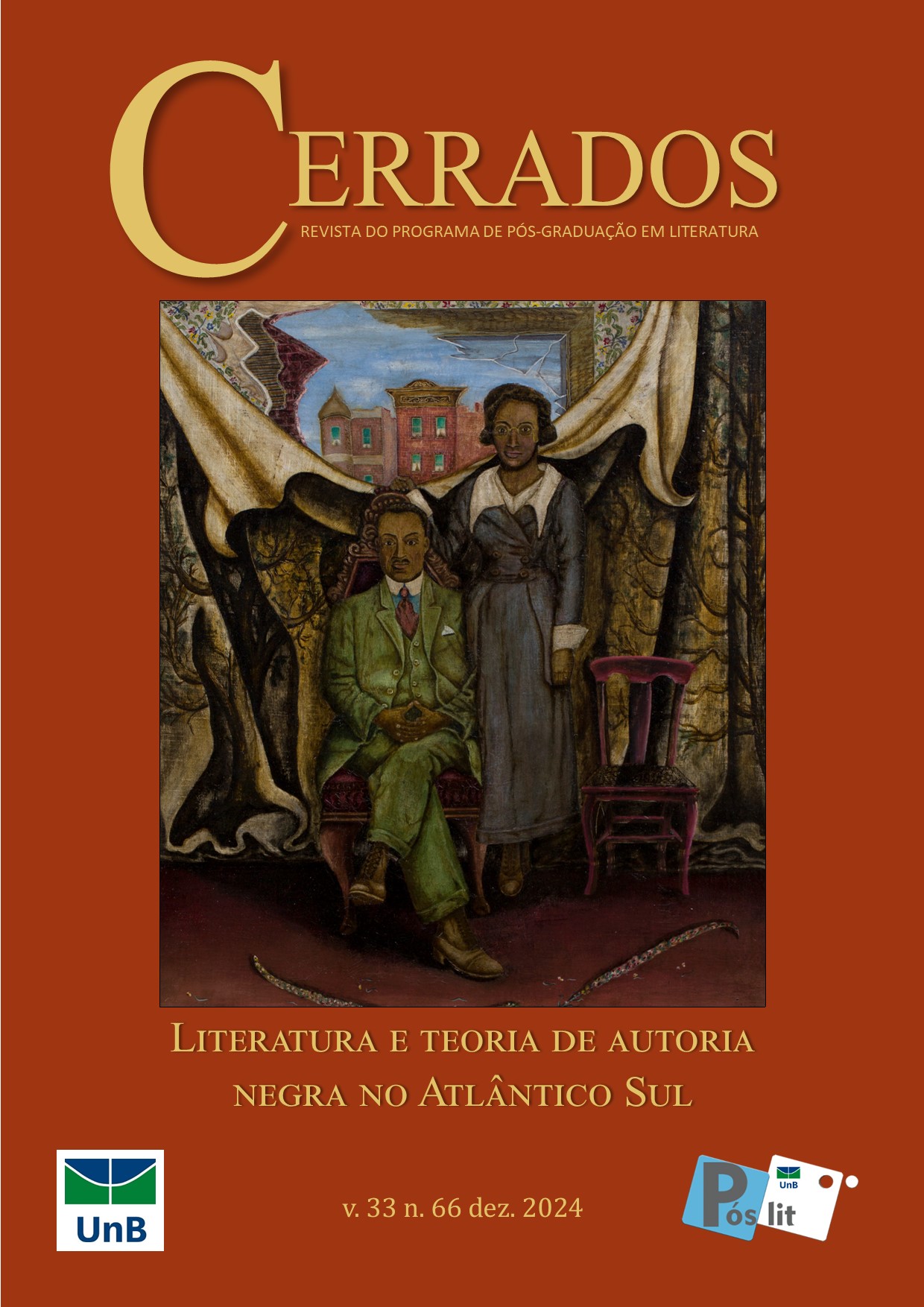Ancestry and identity in the novel “Homegoing”, by Yaa Gyasi
DOI:
https://doi.org/10.26512/cerrados.v33i66.54865Keywords:
Ancestry, Identity, Post-colonial LiteratureAbstract
This study aims to analyze the representations of ancestry in the novel Homegoing (2017), by the Ghanaian author Yaa Gyasi. The represents a selection from the master's thesis of one of the authors and first presents the novel in focus and then the ancestral relationships between the characters and also with the African continent itself. As this is a novel full of female characters, we do not forget to address the issue of gender, especially because Africa itself, is configured as the mother, the womb of humanity. To approach the theme of ancestry, we focus on some of the symbols in the book and are guided by the theory of, Smolka (2000) and Oliveira (2005). As for the gender issue, correlated with the thought and history of Ghana, we used the theoretical foundation provided by Heide Göttner-Abendroth (2013) and Blay (2009)
Downloads
References
ADEBANWI, Wale. Death, national memory and the social construction of heroism. The Journal of African History. Vol. 49, n. 3, nov. 2008, p. 419-444. https://doi.org/10.1017/S0021853708003642.
AGYEKUM, Kofi. The Sociolinguistic of Akan Personal Names. Nordic Journal of African Studies, v. 15, n. 2, 2006. https://doi.org/10.53228/njas.v15i2.24
BLAY, Yaba Amgborale. Color Symbolism. In: ASANTE, Molefi Kete; MAZAMA, Ama (eds.). Encyclopedia of African religion. Los Angeles: SAGE Publications Ltd., 2009.
BLAY, Yaba Amgborale. Asase Yaa. In: ASANTE, Molefi Kete; MAZAMA, Ama (eds.). Encyclopedia of African religion. Los Angeles: SAGE Publications Ltd., 2009.
CÉSAR, Chico. Chico César. Mama África (Remasterizado). YouTube, 2022. Disponível em: < https://www.youtube.com/watch?v=xKL_aJEcNJg> Acesso em: 10 nov. 2022
CHEVALIER, Jean; GHEERBRANT, Alain. Dicionário de símbolos: mitos, sonhos, costumes, gestos, formas, figuras, cores, números. Tradução de Vera da Costa e Silva, Raúl de Sá Barbosa, Angela Melim e Lúcia Melim. 16. ed. Rio de Janeiro: José Olympio, 2001.
GYASI, Yaa. O caminho de casa. Tradução de Waldéa Barcellos. 1 ed. Rio de Janeiro: Rocco, 2017.
HOOKS, Bell. O feminismo é para todo mundo: políticas arrebatadoras. Tradução de Bhuvi Libanio. 15. Ed. Rio de Janeiro: Rosa dos tempos, 2021.
LEITE, Fábio. Valores civilizatórios em sociedades negro-africanas. África: Revista do Centro de Estudos Africanos. USP, São Paulo, v. 18-19, n. 1: pp. 103-118, 1995/1996
LILLY, Weckea. Fire. In: ASANTE, Molefi Kete; MAZAMA, Ama (eds.). Encyclopedia of African religion. Los Angeles: SAGE Publications Ltd., 2009.
MARTIN, Denise. Rocks and stones. In: ASANTE, Molefi Kete; MAZAMA, Ama (eds.). Encyclopedia of African religion. Los Angeles: SAGE Publications Ltd., 2009.
MAZAMA, Ama. Ogun. In: ASANTE, Molefi Kete; MAZAMA, Ama (eds.). Encyclopedia of African religion. Los Angeles: SAGE Publications Ltd., 2009.
OLIVEIRA, Eduardo David de. Filosofia da ancestralidade: corpo e mito na filosofia da educação brasileira. 353f. - Tese (Doutorado) - Universidade Federal do Ceará, Programa de Pós-graduação em Educação Brasileira, Fortaleza (CE), 2005.
SMOLKA, Ana Luiza Bustamante. A memória em questão: uma perspectiva histórico-cultural. Educação & Sociedade. Ano XXI, n. 71, jul, 2000. p.166-193.https://doi.org/10.1590/S0101-73302000000200008.
Downloads
Published
How to Cite
Issue
Section
License
Copyright (c) 2024 Revista Cerrados

This work is licensed under a Creative Commons Attribution 4.0 International License.
Proibida a reprodução parcial ou integral desta obra, por qualquer meio eletrônico, mecânico, inclusive por processo xerográfico, sem permissão expressa do editor (Lei n. 9.610 de 19/2/1998 )



